Share

Solarpunk Presents
Podcasts about creating the future we'd like to live in
Latest episode
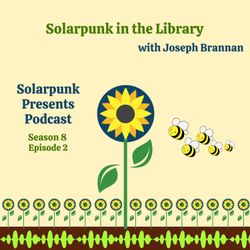
2. 8.2: Solarpunk in the Library with Joseph Brannan
26:00||Season 8, Ep. 2In today’s episode, Ariel chats with Joseph Brannan about sustainability workshop series at the Kitchener Public Library, unionizing library workers, and bringing solarpunk into the sustainability conversation.Links:Everyday Permaculture by Anna MatildaWaterloo Region NatureBuilding for people : designing livable, affordable, low-carbon communities by Michael EliasonLow Tech Magazine articleReep Green Solutions Article on the neighbourhood effect and solar panels
More episodes
View all episodes
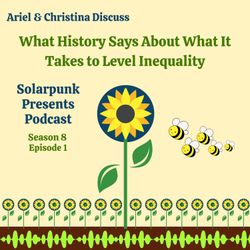
1. 8.1: Ariel & Christina Discuss: What History Says About What It Takes to Level Inequality
01:13:27||Season 8, Ep. 1We like to think that a rising tide lifts all boats. But, according to Stanford University historian Dr. Walter Scheidel, wealth and income inequality have almost always only grown drastically toward the maximum level a society can sustain in times of peace and prosperity. Instead, as he outlined in his book The Great Leveler: Violence and the History of Inequality from the Stone Age to the Twenty-First Century, true leveling of inequality between, for example, the rich and the poor, has almost always happened as a result of exceptionally catastrophically violent events that take the lives of a good chunk of the population (see, for instance: the Black Death, World War II, and the communist revolutions of the 21st century). This has shattered Christina’s previously strong faith in democracy, and we discuss just how and why that happened. Does human society stand any chance of leveling inequality voluntarily, intentionally, and peacefully aka, which is to say, without having to go through an event of widespread death, turmoil, destruction, and suffering? Join us as we wonder whether, in order to reach a solarpunk future world of justice, equality, and harmony, we will ever be able to escape this historical pattern.Links:The Great Leveler by Walter SchiedelThe Four Horsemen of the Apocalypse Encyclopedia Britannica Entry“Government accused of hoarding Canadian history in 'secret' archives” CBC News articleEa-Nasir meme explainerMartyr! by Kaveh Akbar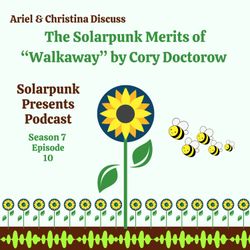
7.10: Ariel & Christina Discuss the Merits of "Walkaway" by Cory Doctorow
01:02:51|Cory Doctorow’s 2017 novel Walkaway has a reputation in solarpunk circles as a great example of a solarpunk lifestyle, and a must-read book for everyone from the individual who lives and breathes solarpunk to the solarpunk-curious to general science fiction fans. But what is it about Walkaway that gives it solarpunk cred? Ariel and Christina ponder this, discussing features of the novel that could be considered solarpunk, and some that might be more post-cyberpunk than anything, and how some of the ideologies and technologies are or have been applied in our present world. Is the world of Walkaway an achievable solarpunk paradise, or a nice hopeful story featuring very cool gadgets and bites of lefty philosophy? Or something else entirely? What is the draw, here, anyway? Join us to think through some of the quandaries and ideas the book raises.Links:https://catholicworker.org/aims-and-means/https://www.reddit.com/r/solarpunk/comments/79r7c7/is_cory_doctorows_book_walkaway_solarpunk/?rdt=44395https://www.reddit.com/r/solarpunk/comments/1fgv88h/has_anyone_on_this_sub_read_walkaway_by_cory/https://theportalist.com/solarpunk-bookshttps://alxd.org/solarpunk-lenses-and-foundations.htmlhttps://us.macmillan.com/books/9780765392770/walkaway/https://edgeryders.eu/t/solarpunk-and-permaculture/12079https://www.reddit.com/r/solarpunk/comments/18ajw7y/solarpunk_fiction_where_to_start/https://www.reddit.com/r/solarpunk/comments/1bfrpy6/solarpunk_fictionutopias/https://en.wikipedia.org/wiki/Tang_pinghttps://pmc.ncbi.nlm.nih.gov/articles/PMC10384867/https://www.bbc.co.uk/future/article/20230120-how-gut-bacteria-are-controlling-your-brainhttps://www.news-medical.net/health/Signals-from-Gut-Biome-to-Brain-and-Behavior.aspxhttps://www.scientificamerican.com/article/whats-so-funny-the-science-of-why-we-laugh/
9. 7.9: Writing (and Doing!) Magical Activism Through Solarpunk Fiction With BrightFlame
51:47||Season 7, Ep. 9In this episode, Ariel talks with BrightFlame: witch, workshop leader, co-founder of the Center for Sustainable Design at Columbia University, and author of solarpunk witchcraft short stories and now a new novel, called The Working. They discuss what solarpunk witchcraft looks like and how, though witchcraft’s manipulation of energy on the astral plane is extremely important, magic is only one half of the equation: the other is activism - actually getting out there and doing the thing, whether it’s attending a protest, contributing to a potluck to strengthen community bonds, or making something with a specific intent in mind. BrightFlame (she/they) writes, teaches, and makes magic towards a just, regenerative world. In her debut novel, The Working, a modern coven must thwart a looming eco-cataclysm and find the key to the bright futures we need. She's a member of the Climate Fiction Writers League and SFWA, and her solarpunk stories are featured in Bright Green Futures, Solarpunk Creatures, Bioluminescent, and Solarpunk Magazine. She’s known for her teaching in the worldwide pagan community and co-founded the Center for Sustainable Futures at Columbia University that features her workshops and nonfiction. She lives on Lenape territory (Turtle Island/U.S.) with a human, a forest, a labyrinth, the Fae, bees, turtles, fungi, and many other nonhumans. Visit brightflame.com for musings, doodles, workshops, and more.Links:https://brightflame.comhttps://waterdragonpublishing.com/product/working/https://starhawk.substack.com/https://starhawk.org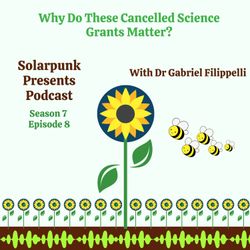
8. 7.8: Why Do These Cancelled Science Grants Matter?
52:25||Season 7, Ep. 8In this episode, Christina talks to Dr Gabriel Filippelli - one of the first scientists to have a running project canceled by the Trump administration. This fascinating interview reveals just how important internationally and domestically these American grants can be, and Dr Filippelli passionately describes this unprecedented attack on science and education and what we all lose when the work that scientists do grinds to a halt or is extremely politically curtailed. It's important, he tells us, to support the institutions that you care about and are vital to the continued knowledge of how to survive our climate-changed future.Dr Filippelli is the Chancellor’s Professor of Earth Sciences at Indiana University Indianapolis and the Executive Director of the Indiana University Environmental Resilience Institute. He works at the junction between biogeochemical cycles, climate change, and human health.Dr Filippelli has also written the book Climate Change and Life: The Complex Co-evolution of Climate and Life on Earth, and Beyond, which explores Earth's ecological resilience to the great changes in climate that have occurred over the history of the Earth. He was also part of the driving force behind Climate Change and Resilience in Indiana and Beyond, which details local efforts to reduce the risks and lessen the harmful impacts of climate change, as well as prepare for the unavoidable consequences of climate change.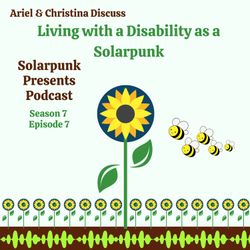
7. 7.7: Ariel & Christina Discuss Living with a Disability as a Solarpunk
58:38||Season 7, Ep. 7Today Christina talks to Ariel about what it's been like to live as a solarpunk with a visible - and then invisible - disability. Science fiction has spent decades dreaming of how future tech will make disabled people able to function as if they were fully abled. Now solarpunk has arrived on the scene to ask why should disabled bodies have to always be the ones to adapt? It can be uncomfortable, intrusive - not to mention expensive. Solarpunk wonders why can't cities, society, workplaces, and the like be the ones to use the tech to make themselves more accessible to and inclusive of disabled people?Tune in as Ariel and Christina discuss the portrayal of disability in science fiction and solarpunk and how having to suddenly live with a disability opens your eyes to many of the ways cities fail people with disabilities.Links:The Spoon Theory: https://www.butyoudontlooksick.com/articles/written-by-christine/the-spoon-theory/The Place of Disability in a Solarpunk Future: https://sammylincroft.medium.com/the-place-of-disability-in-a-solarpunk-future-1db5e40ddb55r/solarpunk plea for solarpunk not to exclude the disabled: https://www.reddit.com/r/solarpunk/comments/oxpj34/please_dont_exclude_disabled_folks_from_a/Disability Justice page by Sins Invalid: https://sinsinvalid.org/10-principles-of-disability-justice/"Disabled People Destroy Science Fiction" Uncanny Magazine: https://www.uncannymagazine.com/article/the-disabled-people-destroy-science-fiction-manifesto/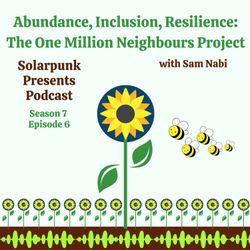
6. 7.6: Abundance, Inclusion, Resilience: The One Million Neighbours Project with Sam Nabi
41:17||Season 7, Ep. 6This episode, Ariel speaks to Sam Nabi about One Million Neighbours, a project bringing together the voices of local non-profits that envisions the future of Waterloo Region once the population has reached one million. Sam discusses the impetus for the project, providing a voice for the voiceless, the issue with grant applications, funding the future, being proactive instead of reactive to harsh policies, and much more. What might an abundant, inclusive, resilient (Ariel says: solarpunk) city look like on the human level? Who lives there, what do they value, and what are their daily lives like? And what does it look like to take action now at the regional/municipal level to ensure that utopian vision?Links:https://onemillionneighbours.ca/https://samnabi.com/https://www.holdthelinewr.org/